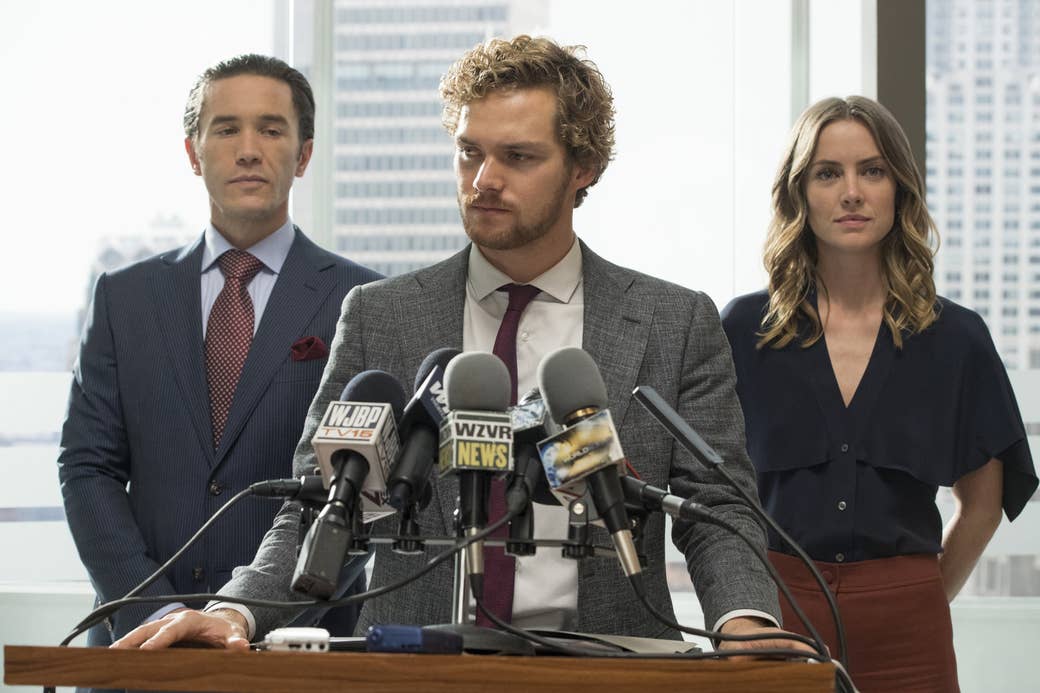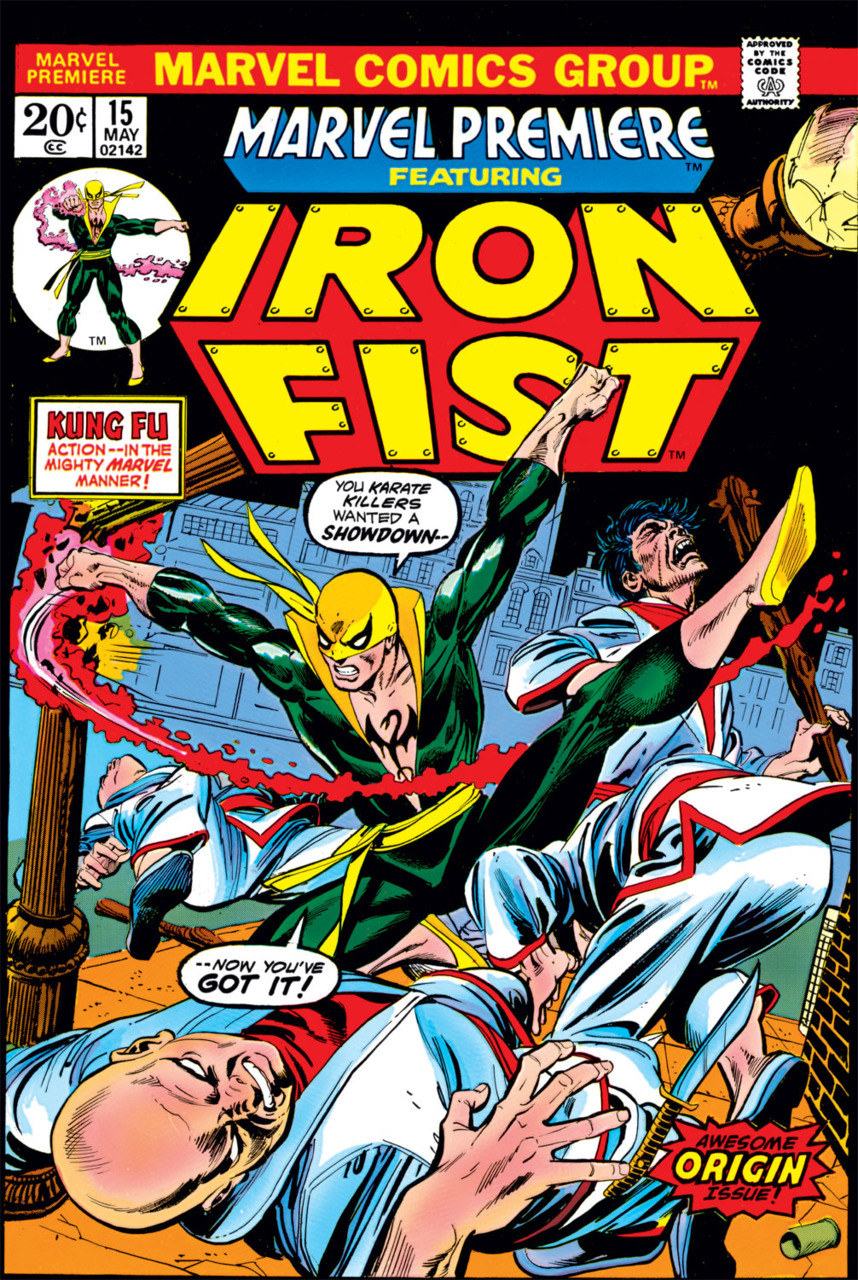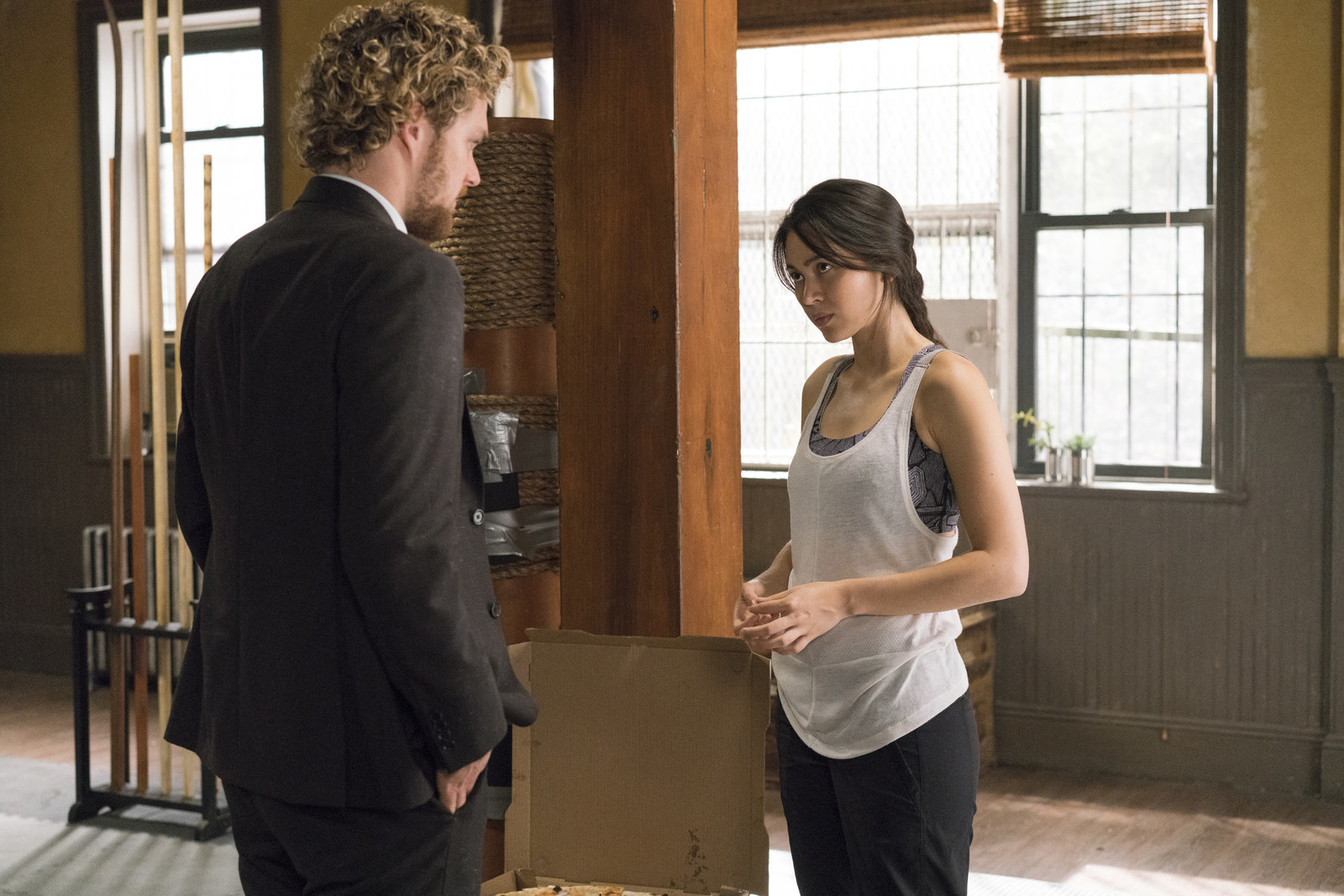
It's been been a year since Finn Jones found out he was cast as the titular character in Marvel's Iron Fist on Netflix, and he remembers that day very clearly. Jones, who had felt pressure to “get the breakout role now when it's hot” after leaving Game of Thrones, had gone to spend the day at Venice Beach with a friend. “We were just chilling out, the sun was setting, and … we watched these two dolphins jump up as the sun was setting,” he said. “Like, 'life is good right now,'” he remembered telling his friend before returning to his car and realizing he had a “million voicemails.”
When Jones finally dialed his agent to hear, “Congratulations, you got the role!” he admitted that he “lost [his] shit.” “I started crying. I, like, got out of the car. I was, like, jumping around,” the actor said. He even woke up his mom in England with a call to tell her the news. “It was a moment of complete just relief that, like, finally, after years and years and years of, like, auditioning and wanting to get the lead in something, and especially something as cool as this, just relief of, like, it finally happened,” the now-28 year old said. “The dream had come true. Something I had worked my whole life for had just happened.”
But as Jones celebrated, a vocal contingent of Marvel fans were doing quite the opposite.
Danny Rand, who has always been white in the comics, was introduced in Marvel Premiere #15 in 1974, a time when after being at war with different parts of Asia, America was ready to accept martial arts, but not ready to accept an Asian protagonist. Many feel the origins of Danny Rand and Iron Fist reek of cultural appropriation and Orientalism, and that casting an Asian-American actor to play Danny Rand would have been a major step toward amending that, as well as increasing Asian-American visibility in entertainment. Soon after the casting announcement about Jones, #AAIronFist was trending on Twitter.
You missed a huge opportunity, @Marvel. You cast a great actor, but you didn't cast the right actor. It hurts. #IronFist #AAIronFist
Iron Fist is an orientalist-white-man-yellow-fever narrative. Asian actor would have helped subvert that offensive trope, and reclaim space.
Danny should have been Asian-American. Period. Anything else is White Saviorism, tbh. #AAIronFist https://t.co/4jBFxZkc3s
It wasn't long after Jones was happy-crying about landing his first lead role that he learned about the criticism of Iron Fist, which he's continued to hear over the course of the year. Though Jones did not cast the role of Danny Rand, he did accept it — and soon, he became the face of the controversy. "It's up to the writers to address thematic and narrative choices," Jones told BuzzFeed News diplomatically of how he approached the character in the wake of the backlash. "And it's up to us as actors to try and breathe life into these characters as truthfully and as honestly and with [as much] genuine passion as possible.”
When asked directly about his thoughts on the controversy, Jones paused and finally said, "You know, here is what I'm going to say about it. I get where that frustration comes from. I get the need for diversity and equality in television and film... well, actually in every aspect of life. Right now we live in a culture and a world where we are very unequal in politics, in economics, and in culture. We are being fucked over massively by the top dudes. I stand up for people, I stand up for people across all borders."

Jones went on to stress that "there needs to be more diversity in television and film, especially for Asian actors." He explained, "With this instance in particular, what I struggle with and what frustrates me is that people are commenting on the headline without understanding the full picture, without understanding the full story. What you'll find with the way that we're telling this story is we're addressing the issues that people are very concerned about in a very intelligent and modern way.
"Danny Rand is not a white savior. Danny Rand can hardly save himself, let alone an entire race of people. He is a very complicated, vulnerable individual. He doesn't just show up, like, 'Hey dudes, I've just learned martial arts! I'm going to save the world,'" Jones said in a surfer voice. "Actually, it's the complete opposite. He's gone through and suffered immense trauma and he is struggling to claim his own sanity and identity back."
While Danny Rand has always been white, K’un Lun — the mystic city where Iron Fist lives in the comics, that materializes in the heart of the Himalayas once a decade — has always been presented as a part of Asia. Its inhabitants in the comic books are characters like Shou-Lao and Master Khan, and on the Netflix series, Danny, having only lived in K’un Lun and New York City, shows he is fluent in Mandarin Chinese in the first episode. According to Jones, the creators of Iron Fist took steps to right some of those wrongs that linger from the sort of American kung fu B-movie scene that the Iron Fist comic was borne out of.
"In the comic books, that place is essentially an Asian culture," Jones said of K'un Lun. "Now K'un Lun in our version, it is a very diverse place. It's a mystical kingdom in an alternate dimension, but it is populated by people from all over the map. You've got South Americans there, you've got Europeans there, you've got of course Asians there. It's a diverse space, and we address Danny's inability to honor and hold responsible the Iron Fist — like, that is part of the story, the fact he has this title, but is unable to harness the responsibility of what that means. And Danny is on a journey to hopefully better himself and hopefully learn to earn the right to hold the Iron Fist... and hopefully in that journey, we address the issues which people are concerned about."

The show plays with the perception of Danny early on in one of his first scenes opposite Colleen Wing (Jessica Henwick), dojo owner, master martial artist, and Danny’s eventual partner in crime fighting. When trying to get a job at Wing’s dojo, Rand begins speaking Mandarin to her as a way to impress her, and she tries to respond as best she can before stopping him to say she’s only fluent in English and Japanese.
“Just because we have this color skin, it doesn't mean we have to conform to preconceived notions of our culture," Jones said of the scene. "We are human beings on this planet, and we all individually have different attributes. We're not stereotypes, and hopefully, that's what the show does. Hopefully the show doesn't — I don't think it does — deal in stereotypes, which I think people are worried about.”
If Iron Fist viewers continue to find Netflix's origin story of Danny Rand problematic, Jones urged them to stick around, saying the show only gets better and better at exploring Danny’s place in the world. “It's not until [Episode 8] where you have other characters come in from other places that we really start playing around with the idea of Danny being the Iron Fist and addressing those issues," Jones said. "Then you're really like, Oh shit, now we're getting into those philosophical ideas of identity and culture.'"
